Dr. Hazel Elif Guler on Nov 23rd 2016 Rhetoric
Due by 10:30 a.m. on Tuesday, December 6th
For this blogging assignment, write a reflection about your experience in ENGL 305 – Rhetoric and Public Culture: Presidential Debates in a Global Theater. Reflective writing enables one to gain a better understanding of the self and the relationship between one’s self and the world, by exploring personal attitudes, experiences, and memories. As you write, you look forward to the goals that you might achieve and backward to see what you have accomplished so far. Writing prompts (such as below) help your thinking in this process.
Please respond to the following questions in sufficient detail (presented in the form of an enumerated list or a paragraph), and post your response to your individual course blog:
1) Which one of our ENGL 305 course texts was your favorite? Why?
2) How can you, in general, incorporate the knowledge and experiences gained from this class into your personal, academic, and professional life beyond this classroom? Provide some examples. Then, think of a specific question or issue that is somehow pressing to you right now. How would you use the knowledge from this class (e.g., knowledge of rhetoric and/or rhetorical perspectives) to gain perspective on this question or issue?
3) This link provides a list of transferable skills: THE LIST. Which ones of these skills do you think you have gained and/or practiced in ENGL 305? Make a list of the skills you’ve identified for future reference (e.g., during your job search). Then, write make a few statements about the actions taken for our ENGL 305 class. You can create statements such as: “While taking ENGL 305, I gained experience in or learned X, Y, Z.” Yet, you should also present your skill more directly as a verifiable qualification, such as: “While taking ENGL 305, I researched X and collected data on Y to write a conference paper on Z.”

Public Domain Image posted on Pixabay.com by geralt
Dr. Hazel Elif Guler on Nov 3rd 2016 Rhetoric
Due by the class period on Monday, November 7th
With the assignment guidelines in perspective, make a new posting in your blog presenting the outline as well as a purpose statement and a tentative thesis statement for your upcoming Conference Paper.
Reminder: Our one-on-one writing conferences on this paper will take place on Nov 14 and 16, so you should also be producing a draft of this paper until then (see the assignment guidelines on submission).
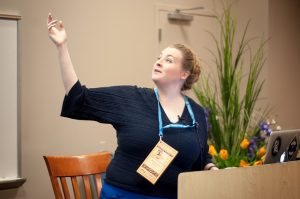
Creative commons image posted on Flickr by WordCamp Chicago
Dr. Hazel Elif Guler on Oct 14th 2016 Rhetoric
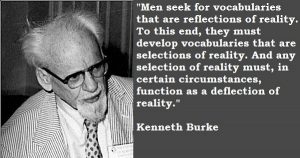
Due by the class period on Monday, October 17th
On Monday, October 17th, we’ll discuss Burke’s essay, “The Rhetoric of Hitler’s Battle” (191-220 in Philosophy of Literary Form). Here are your blogging prompts on this essay:
1) At the beginning of his essay, Burke states: “The appearance of Mein Kampf in unexpurgated translation has called forth far too many vandalistic comments. There are other ways of burning books than on the pyre–and the favorite method of the hasty reviewer is to deprive himself and his readers by inattention. I maintain that it is thoroughly vandalistic for the reviewer to content himself with the mere inflicting of a few symbolic wounds upon this book and its author, of an intensity varying with the resources of the reviewer and the time at his disposal” (191). What is Burke’s claim here? What are the implications of this claim?
2) Burke provides a list of features that explain Hitler’s rhetorical “unification” device. List those features, and give an example of how each is evident in Hitler’s rhetoric.
3) Which (if any) of Burke’s list of unification devices are currently being used by any of the candidates in the ongoing presidential campaign (for example, at the second presidential debate)? Mark those ideas in your hard copy of the essay and take a note about them in your blog. If possible, incorporate a link or a video to your posting exemplifying the use of the rhetorical device. Be ready to share your ideas during our discussion on Monday.
Dr. Hazel Elif Guler on Oct 9th 2016 Rhetoric
Due by the class period on Wednesday, October 12th
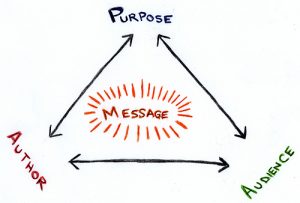
Rhetorical Triangle. Creative Commons Image posted on Flickr by Ted Major.
For this posting, state your conference paper topic and include at least two sources you can use for your project (primary or secondary sources). The questions your posting should answer:
1) What is the cross-national text discussed (or to be discussed) this semester that you want to use as a springboard to examine the rhetoric of a selected issue? What is the issue that you will focus on? (The text will provide the inspiration for your selection of an issue and will serve as an example of an effective rhetoric on the issue. You will first want to identify some textual evidence, such as quotes from Trudeau’s speeches, to illustrate his effective rhetoric: for example, his efforts to address diversity in the Canadian nation through his celebratory messages published on his social media sites.)
2) Which figure from the 2016 US presidential race will you focus on (whose rhetoric will you analyze) in your conference paper? It’s possible to choose a single figure or more than one figures, which may be one of the presidential or vice presidential candidates, their prominent supporters such as their party members or the previously elected presidents, first ladies, etc. This list can even include celebrities who spoke about the selected issue as part of the presidential race, for example, at an RNC or a DNC gathering. (You will then look at the rhetoric of an issue such as “diversity” within the discourse of your selected affiliate with the 2016 presidential race: e.g., Donald Trump’s discourse about diversity. Your ultimate goal with your essay will be either to promote your selected rhetor’s effective discourse about an issue or lay out the problems with the discourse and make suggestions for improving the rhetoric to better address certain individuals or groups’ issues and rights. Contact me if you need to discuss ideas.)
3) What will be your primary and secondary sources for this exploration? Include at least two specific examples with a brief description of each source.
Dr. Hazel Elif Guler on Oct 7th 2016 Rhetoric
Our class members did a great job with sharing their post-debate reflections at The Office of International Affairs First Thursdays Event, “An Effective Rhetoric for Global Peace and Understanding: Students’ Insights for Presidential Candidates,” on October 6, 2016.
Some excerpts from the insights shared with Longwood students:
“Rhetoric refers to the purposeful use of language and the classic art of making effective arguments. Plato suggested that rhetoric should be used to find the truth and achieve justice. Aristotle defined it as the use of the available means of persuasion. Quintilian said only good and virtuous men should practice the art of rhetoric. Various other key figures across cultures and nations also studied rhetoric and offered their own definitions and interpretations of this art.”
“The presidential candidates seem to make various arguments. The question is: are these effective arguments?”
“Jay Heinrichs, a persuasion guru who has applied rhetorical principles, from business transactions to family quarrels, observes that ‘We need to distinguish rhetorical argument from the blame-shifting, he-said-she-said squabbling that defines conflict today. In a fight, each disputant tries to win. In an argument, they try to win over an audience’ (Thank You for Arguing).”
“Albert Einstein once said: ‘The world is a dangerous place, not because of those who do evil, but because of those who look on and do nothing.’ We concur with this statement, but we also contend that the world is a dangerous place because of those who say nothing or say the wrong thing. We hope that our presidential candidates work to achieve global peace and understanding by awakening the idea that it all begins with their use of language. Rhetoric is more than a tool of persuasion–it is the fundamental difference between conflict and progressive argument.”
Well done, ENGL 305: Rhetoric and Public Culture students!


Dr. Hazel Elif Guler on Sep 29th 2016 Rhetoric
Our upcoming panel event has been scheduled for 4:00 p.m. on October 6th in Bedford 111 at Longwood University. Looking forward to it!
“An Effective Rhetoric for Global Peace and Understanding: Students’ Insights for the Presidential Candidates”
This interactive session will promote an understanding of how our presidential candidates can and should function on a world stage when the goal is to foster global peace and understanding. A panel of Rhetoric & Professional Writing students will share their insights on the current climate of U.S. presidential rhetoric. By engaging the audience in this discussion, they hope to suggest that the principles of rhetoric can be shared on a global, regional, and local stage.
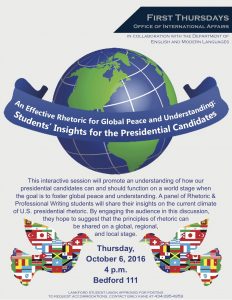
Dr. Hazel Elif Guler on Sep 18th 2016 Rhetoric
Due by the class period on Wednesday, September 21
Reflections on Michael Dirda’s talk: Review this link before you complete this blog post: the Toulmin model of rhetoric. According the Toulmin model, a basic argument consist of the following: claim + support + warrant. When you attend Dirda’s talk in Blackwell Hall at 5:30pm on Sep 19th, listen to his ideas about global citizenship closely. What are some of his claims (give at least one or two examples)? What is the support he provides for those claims? What are the assumptions implied in his arguments (which link his claims to his support for them).
*If you have to attend another debate event due to scheduling conflicts, complete this posting based on a Toulmin analysis of one of the rhetors featured in the respective event (such as one of the debaters during the mock debate on the 21st, etc). Once you attend an event, you can take until our following class period to make your posting. Let me know if you have any questions about this prompt.
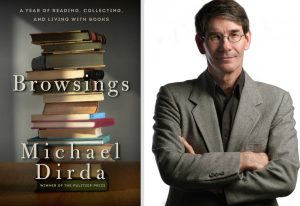

Dr. Hazel Elif Guler on Sep 7th 2016 Rhetoric
Due by the class period on Friday, September 9
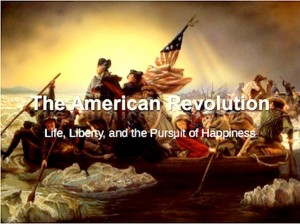
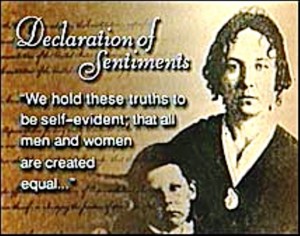
On Friday, we’ll start considering historical examples of discourses on various public issues in various global contexts. We’ll also consider your selections in relation to the texts we have reconsidered this week in the context of an election year: The Declaration of Independence and the Declaration of Sentiments.
By Friday’s class, do some search to identify a relevant online text from the current or historical presidential debates (a portion of a debate, a speech in the context of presidential debates, or other artifacts)–this should be a text that resonates with the narratives in the Declaration of Independence or the Declaration of Sentiments.
Then, create a new post in your own Course Blog which either embeds or includes a link to the text of your selection, and explains the “intertextuality” of your selected text and one of the declarations. In other words, how is one text related to the other? How does the latter text reference the previous text? How are their narratives overlap or diverge (in terms of the narrative’s treatment of a group, or its messages about American cultural values, etc)?
Dr. Hazel Elif Guler on Aug 31st 2016 Rhetoric
Due by the class period on Friday, September 2
For our meeting on Friday, create a new post in your own Course Blog which presents your own example of discourses from the presidential race (in the form of a speech or another genre that is available online, like a campaign video) that can be analyzed through narrative criticism. Provide a link to the rhetorical artifact of your selection (speech video or transcript, YouTube video of a campaign piece, etc) so we can access it during the class period. Your posting should also provide a preliminary assessment of the narrative in your selected rhetorical artifact:
- How does the construction of this narrative direct our interpretation of a situation? What are the consequences of that interpretation?
- What does the narrative reveal about an individual’s identity (either the author or the intended audience)?
- What does the narrative suggest about the values of a particular culture?

Dr. Hazel Elif Guler on Aug 31st 2016 Rhetoric
https://www.youtube.com/watch?v=XVXV4fG33Zk
On Wednesday, August 31, we will consider another speech from the different sides of the 2016 US presidential race. This time, we’ll look at the rhetoric of Paul Ryan’s RNC speech through the lens of narrative criticism.
Watch the speech, and respond to the following prompts. I’ll later include some of your responses in this posting.











